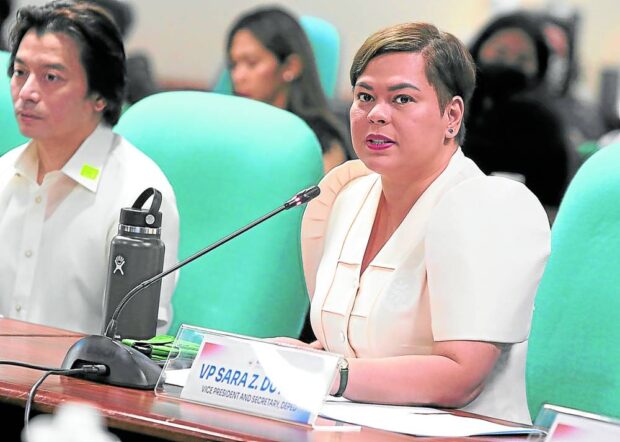
Vice President Sara Duterte (File photo from the Senate Public Relations and Information Bureau)
MANILA, Philippines — Over a fifth of the proposed budget for the Office of Vice President (OVP) will be used for its “confidential” expenditures in 2024, the second year in a row that the OVP would be seeking a fund that does not require public disclosure of its accounting, unlike other regular government spending.
As education secretary, Vice President Sara Duterte again proposed a P150-million confidential fund for next year, the same amount that was given by Congress to the Department of Education (DepEd) in the 2023 budget.
The P500-million confidential fund sought by the OVP would account for 21 percent of its proposed 2024 budget of P2.374 billion, which is 1 percent higher than its budget of P2.343 billion for 2023.
It is more than the P471.29 million in confidential funds that the Department of Justice is asking for next year.
DepEd’s budget totals P712.44 billion, the second-biggest proposed allocation behind the P822.2 billion for the Department of Public Works and Highways.
Opposition lawmakers and critics of confidential and intelligence funds, particularly for agencies not directly involved in national security, say the money should instead be allocated for services, projects and programs that directly benefit the people.
Last year, Albay Rep. Edcel Lagman called for a “purge” of “unnecessary and excessive” confidential and intelligence funds in the P5.268-trillion budget for 2023.
Lagman singled out the OVP’s P500 million and DepEd’s P150-million confidential funds.
He said “no stretch of the imagination or flexibility of logic” could justify the inclusion of these funds in two government agencies that are not concerned with surveillance and national security.
Confidential expenses are those associated with surveillance that are intended to support an agency’s operations.
Intelligence expenses are those for information-gathering activities that have a direct impact on national security by the military, police, and other uniformed personnel, as well as intelligence agencies.
The use of such funds is “generally confidential and classified” but requires “strong internal controls” and “strict accounting and auditing rules to prevent mishandling or improper application of the funds.”
Those are the requirements set by a joint circular of the departments of budget, interior and local government, national defense, Commission on Audit, and the Governance Commission for Government-Owned and Controlled Corporations.
‘Profligate allocations’
The P10.14 billion total for confidential and intelligence funds for 2024 is a little higher by P120 million compared to what was allocated for 2023, according to Budget Secretary Amenah Pangandaman.
She said the increase was due to the additional funds requested by the Department of Information and Communications Technology, the Anti-Money Laundering Council, and the Presidential Security Group.
In a statement to the Inquirer last week, Lagman said he would pursue his advocacy against “profligate allocations for confidential and intelligence funds” in the President’s P5.768-billion National Expenditure Program (NEP) for 2024.
He said these were “excess fat” which must be “excised and reallocated” to socioeconomic services, particularly education and health.
Opposition Sen. Aquilo Pimentel III also questioned the Marcos administration’s sense of priority in allocating billions of pesos for intelligence and confidential funds, particularly following the destruction caused by recent storms.
He said this raised “serious questions about the government’s understanding of the real needs and challenges faced by our country.”
“It shows the lack of empathy and understanding of the real needs of ordinary Filipinos,” he said in a statement, adding that the hardships experienced by storm-devastated areas in the country “require a robust response from the government.”
The allocations for the OVP, DepEd, and other departments are laid out in the 2024 NEP, or the government’s spending plan. Once approved by Congress and enacted by the President, it would be known as the General Appropriations Act, or the national budget.
The proposed budget for the OVP is 336 percent higher than the P543.9 million approved in 2018 for then Vice President Leni Robredo in her second year in office.
A big chunk of it is for “financial assistance and subsidy” amounting to P920.8 billion, or 38 percent. The beneficiaries of the assistance and subsidy were not specified in the NEP.
DepEd budget
The OVP’s request for travel expenses is P62.5 million, up from P59.5 million in 2023, but much smaller than the P1.408 billion requested for next year’s foreign and local trips by President Marcos.
The OVP also requested P95.36 million to pay for the salaries of its employees, plus P25.308 million in special duty allowances for military and uniformed personnel assigned to the Vice President’s office.
The proposed DepEd budget of P712.44 billion also includes P3.06 billion for travel expenses, much more than what the Office of the President had proposed to finance the trips of Mr. Marcos.
The DepEd central office asked for P146.12 billion, the lion’s share of its budget.
It is proposing a P33.75-billion allocation for its basic education facilities program, which will go to the construction and repair of school buildings and sanitation facilities and the purchase of school desks, furniture and other fixtures.
It plans to spend P3.55 billion for the production of self-learning modules (SLMs) under the flexible learning program, which would need a total of P4.27 billion, a little less than the P4.29 billion in 2023.
The SLM was the primary learning tool of the modular distance learning policy adopted in the Philippines at the height of the pandemic. The 2024 allocation for SLM is higher than the P2.6 billion in 2023.
DepEd sought P11.711 billion for its school-based feeding program and asked for P999.25 million for its special needs education program.